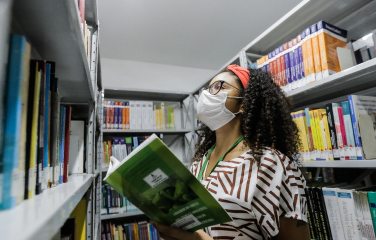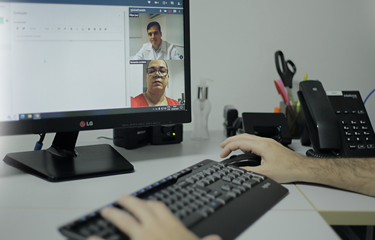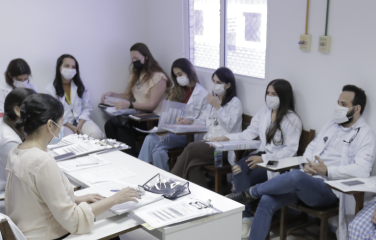



Since its foundation, IMIP has been focused on the education and training of healthcare professionals, and over the years it has become a large school within a hospital. It offers activities related to teaching in all areas of healthcare, and is certified as a teaching hospital.
With over 3,500 students regularly enrolled in different programs and modalities, it covers technical education, undergraduate (supervised practice fields), lato sensu and stricto sensu postgraduate studies, as well as advanced training courses and opportunities for short-term internships (clinical fellowship) in various areas of healthcare.
Click here and check out the IMIP Teaching and Research Program
HOW TO BE SERVED:
To receive assistance and information about any teaching program at IMIP, there is an academic secretary. Her goal is to quickly and effectively carry out all procedures involving academic control and registration, as well as to assist and guide students, teachers and the general public.
Contacts:
(81) 2122. 4734 (Reception)
(81) 2122.4148 (Lato sensu)
(81) 2122.4355 (Stricto sensu)
E-mail: secretariaacademica@imip.org.br
Professional Master’s Degree in Intensive Care - link
Elevate Your Career in Healthcare.
Deepen your knowledge and develop advanced skills in teaching and research through our Professional Master’s Program in Intensive Care. Become a leader in your field, prepared to innovate, educate, and transform healthcare practices.
Training health professionals in Intensive Care, qualified to work in the areas of patient care, teaching, and research.

Professional Master’s Degree in Intensive Care
The stricto sensu Graduate Program of the Professional Master's in Intensive Care is integrated with the residency program of the Instituto de Medicina Integral Prof. Fernando Figueira (IMIP). It was established in 2011 and holds a CAPES rating of 3.
It has a multidisciplinary focus and an innovative curriculum designed around key aspects of intensive care. The program is based on active learning methodologies, particularly problem-based learning (PBL), and is structured to accommodate both the residency schedule and the specific needs of the resident-student.
This is a stricto sensu graduate program with the mission of training health professionals with solid knowledge in Intensive Care, prepared to assume teaching roles and to integrate clinical care teams as well as scientific and technological research groups. The program fosters a critical, innovative, and transformative perspective aimed at improving local and regional health realities.
Target Audience
Residents enrolled at the Instituto de Medicina Integral Prof. Fernando Figueira (IMIP) and active Residency Preceptors who participate in the governing bodies of their respective residency programs.
Program Objectives
General Objective
To equip graduate students with the technical and scientific skills necessary to perform with excellence, enabling them to engage in advanced, transformative professional practice and teaching using active learning methods, and to apply technological innovation in response to both social demands and specific needs for regional and national development.
Specific Objectives
The program aims to enhance the competencies and skills of its students by enabling them to:

Area of Concentration – Intensive Care in Health
Description:
This area encompasses epidemiological, clinical, translational, and disease prevention studies in intensive care across all stages of the life cycle, approached from an interdisciplinary perspective. It also emphasizes research in management, innovation, technology development, and the training of human resources capable of addressing regional challenges related to intensive care.
Research Lines:
1 – Intensive Care Across the Life Cycle
Description:
Focuses on the study of prevention, assessment, and intervention processes in intensive care, from birth to aging, centered on the patient and their family.
2 – Clinical, Translational, Epidemiological, and Preventive Studies of Health Conditions
Description:
Includes clinical, translational, epidemiological studies and research on the prevention of adverse health conditions in intensive care settings.
3 – Management, Innovation, and Interdisciplinary Evaluation in Intensive Care
Description:
Covers studies on management, innovation, and interdisciplinary evaluation in intensive care, involving health conditions of individuals, services, and health programs. It also includes the analysis of new health technologies.
Curricular Structure
The Master’s Program in Intensive Care requires a minimum of 33 credits, totaling a minimum workload of 495 hours.
The academic activities of the Intensive Care Master’s Program are offered through the Problem-Based Learning (PBL) method, which is implemented through tutorial modules and laboratory sessions (mandatory courses), distributed as follows:
Mandatory Tutorial Modules
Mandatory Laboratory Modules
In addition, students are required to complete:
Each year, the program offers a selection of elective courses aligned with the concentration area and research lines of the Professional Master’s Program, ensuring that content remains current and relevant to emerging demands in the field of Intensive Care. Available electives include:
Degree Completion
The Master’s Program must be completed within 12 months.
To obtain the degree, students must fulfill all the requirements established by the regulations of the stricto sensu Graduate Program — the Professional Master's in Intensive Care linked to the Health Residency at IMIP.
Selection Process
Twelve (12) spots are offered annually for the Professional Master’s Program in Intensive Care. The selection process consists of the following stages:
The following stages are only for candidates approved in the specific knowledge/English tests:
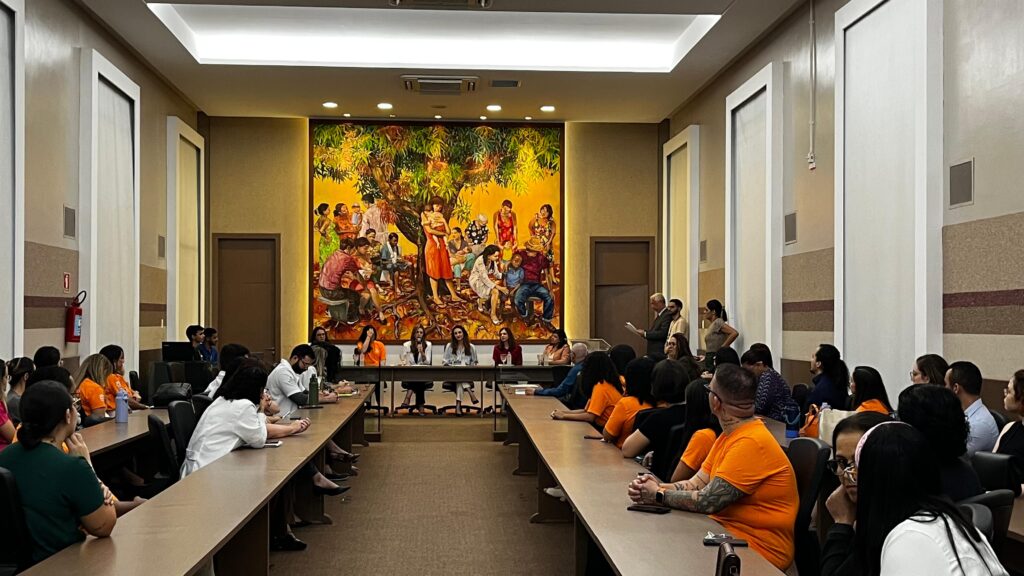
Physical Facilities
The program occupies a total area of 476 m² across two floors. It has 8 air-conditioned classrooms, each with a capacity of 30 people, equipped with audiovisual resources and high-speed internet access. There are also faculty offices, a break room, restrooms, circulation areas, and a special room for thesis defenses (Prof. G. J. Ebrahim Room), with a capacity of up to 80 people.
Computer Lab
The Computer Lab measures 70 m² and contains 18 computers connected to the internet via fiber optics. The equipment includes data analysis and statistics software such as Stata, SPSS, Epi-Info, and artificial intelligence tools, as well as an interactive multimedia projector for practical activities and training sessions.
Telehealth and Digital Health Laboratory
IMIP maintains two Telehealth laboratories, each with a capacity of 30 people, equipped with video collaboration technology. The Digital Health Coordination, established in 2022, integrates innovative projects such as Indigenous Telehealth, OncoHelp, and Virtual First, and also operates the IMIP Studio for recording video lessons and broadcasts. Learn more [https://imip.org.br/o_ensino/saude-digital/]

Ana Bove Library
The Ana Bove Library specializes in health sciences and provides informational support to IMIP students and professionals. It offers access to the CAPES Periodicals Portal, REDCap, Virtual Health Library, in addition to services supporting research and scientific production. Learn more [https://imip.org.br/o_ensino/biblioteca/]
Auditoriums and Event Rooms
IMIP has 8 auditoriums dedicated to teaching, research, and academic events. Notably, the IMIP Science and Culture Space has a capacity for 720 people, climate control, and high-quality sound and image systems. In total, there are more than 1,360 seats available across auditoriums and rooms. Learn more [https://imip.org.br/o-imip/teatro-do-imip/]
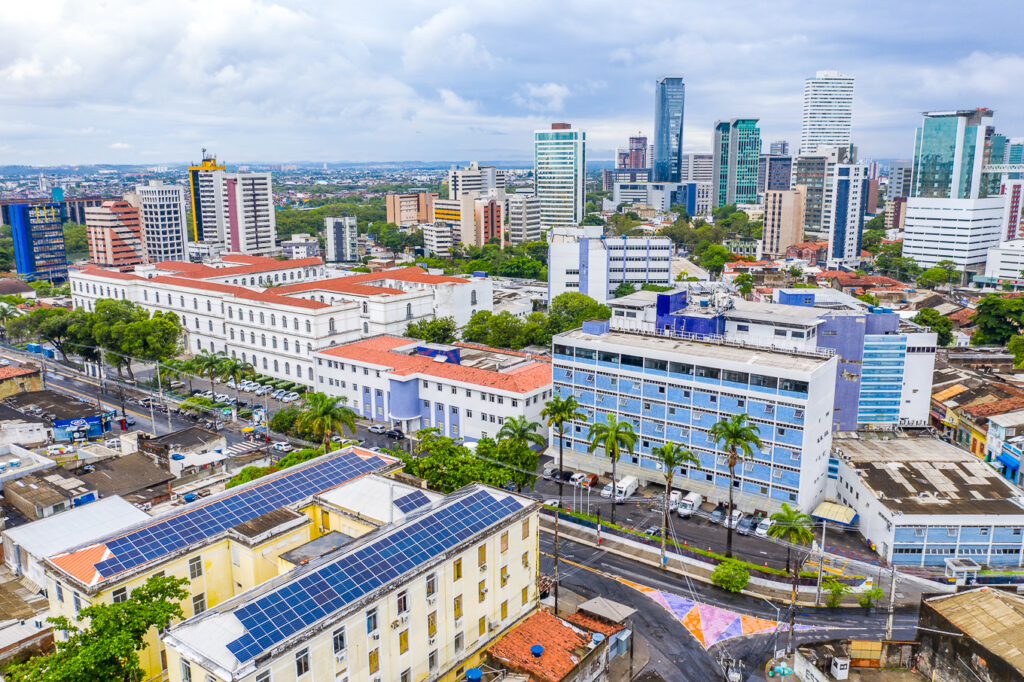
IMIP Hospital Complex
With an area of 69,000 m², the IMIP hospital complex has 1,075 beds, including 101 intensive care units (ICU), and performs over 800,000 consultations and 49,000 hospitalizations annually. The hospital infrastructure is fundamental for the development of clinical and epidemiological research integrated with the graduate program. Learn more [https://imip.org.br/o-imip/quem-somos/]
Research Laboratories
The program has access to various specialized laboratories:
• Clinical Analysis Laboratory (360 m²)
• Pathology Laboratory (110 m²)
• Molecular Biology and Immunophenotyping Laboratory (65 m²)
• Imaging Laboratory (250 m²)
• Thematic laboratories in the areas of child health, women’s health, nutrition, and service evaluation
• Oncology Laboratory, in partnership with St. Jude Children’s Research Hospital (USA)
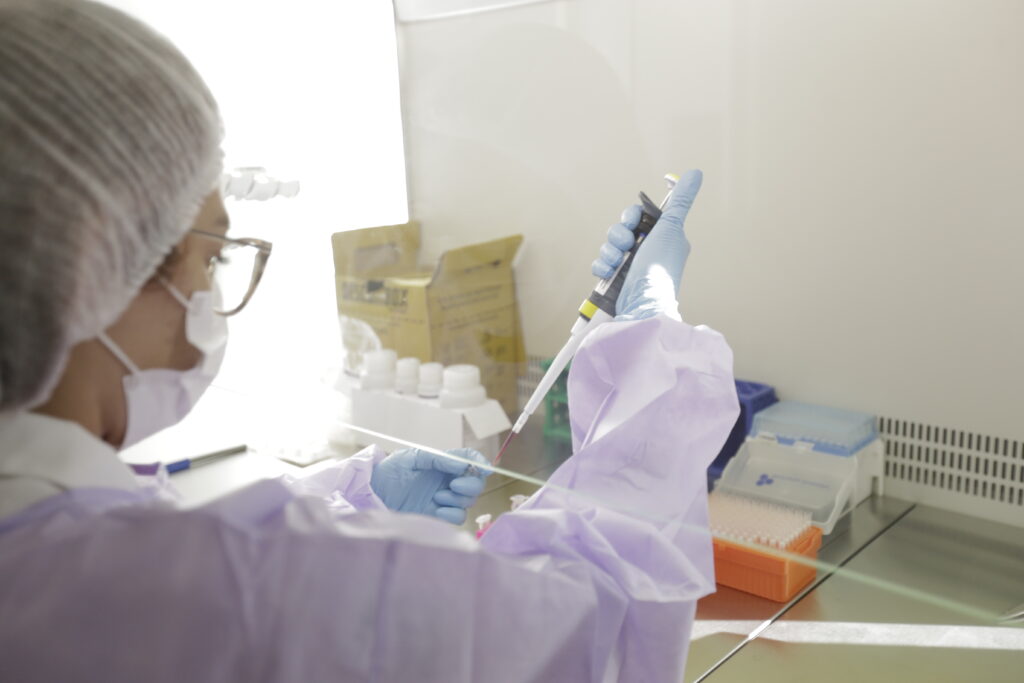
IMIP Research Infrastructure
Clinical Research Center (CRC)
The CRC occupies 450 m² and includes beds, offices, collection rooms, and facilities for clinical studies in areas such as oncology, cardiology, rare diseases, and vaccines. The center also offers an annual advanced course in clinical research.
Translational Research Laboratory
Led by Prof. Dr. Leuridan Torres, the Translational Research Laboratory conducts basic and applied research in molecular biology, cell culture, and cytometry, using high-tech equipment.
IMIP Biobank
A pioneer in the Northeast region, the IMIP Biobank stores biological samples for research in oncology and rare diseases, serving as a strategic resource for advancing translational science.
Shared Laboratory
A shared space equipped with HPLC, real-time PCR, flow cytometry, among other resources. It serves researchers from IMIP and partner institutions.
Research Support Center (NAP)
NAP offers technical and methodological support to the program’s researchers, including statistical consulting, database development, assistance with funding applications, and research reports.
Research Ethics Committee (CEP-IMIP)
Coordinated by Dr. Lygia Carmen de Moraes Vanderlei, CEP-IMIP reviews research projects involving human subjects. Composed of a multidisciplinary team, it holds regular meetings and has its own facilities for public service.
Learn more [https://imip.org.br/a-pesquisa]
The Professional Master’s in Intensive Care at IMIP is fundamentally committed to producing applied knowledge, generating scientific, social, and economic impact aligned with real-world demands and Brazil’s strategic development needs. The program’s ongoing self-evaluation allows for a critical analysis of the effectiveness of its scientific and technological output, ensuring coherence with the challenges faced by intensive care services and promoting continuous improvement.
The program’s academic output stands out for its publication of scientific articles in high-quality journals, the development of innovative technical-technological products, and the dissemination of knowledge at national and international events. During the four-year period (2017–2020), the program maintained a high rate of indexed publications, including articles in A1 to B1 strata, as well as the development of care protocols, clinical practice guidelines, mobile applications, and educational materials aimed at improving intensive care.
The interdisciplinary nature of the research, involving professionals from various healthcare fields, strengthens the quality of scientific output, expanding its applicability and relevance. The impact of the program’s studies can be seen in the adoption of dissertation-developed products in hospital units, contributing to improvements in clinical and administrative processes.
The program plays an active role in training highly qualified professionals, with graduates strongly integrated into intensive care practice, management, and teaching. The dissertations produced have led to tangible changes in clinical practices, enhancing patient safety, care quality, and the adoption of evidence-based guidelines.
Additionally, the research addresses socially relevant topics, such as patient safety, critical disease management, intensive care unit (ICU) protocols, and innovative hospital management strategies. The products generated by dissertations have been incorporated into routine hospital services, directly contributing to improved patient care.
The program’s active participation in scientific events, academic exhibitions, and interinstitutional partnerships reinforces its commitment to knowledge dissemination and professional exchange, ensuring that advancements have a lasting positive impact on society.
The applicability of the program’s outputs contributes to healthcare system optimization, promoting greater efficiency in intensive care and reducing operational costs. Care protocols and clinical guidelines developed in the master’s program have been adopted in hospitals and healthcare units, shortening hospital stays, optimizing ICU bed usage, and minimizing preventable complications—directly improving the financial sustainability of healthcare institutions.
The training of master’s graduates with expertise in management, innovation, and intensive care evaluation also strengthens leadership capacity, enhancing service efficiency and driving improvements in public health indicators.
The IMIP Graduate Program in Intensive Care fosters international and national academic and research exchanges, promoting collaborative and systematic knowledge production.
The graduates of IMIP's Professional Master's Program in Intensive Care represent one of the key indicators of the Program's effectiveness and impact. Trained with a solid foundation in patient care, research, teaching, and management, these professionals stand out in healthcare institutions and higher education throughout Brazil, with particular emphasis in the North and Northeast regions.
Our alumni profile consists of critical, innovative professionals committed to improving intensive care standards. Many work directly in high-complexity intensive care units, while others hold strategic positions in hospital management or serve as faculty members in universities and professional training centers.
The career progression of our graduates is continuously monitored through various instruments, including annual surveys, Lattes curriculum analysis, and tracking via professional social networks and scientific databases. This strategy enables us not only to measure the impact of our training but also to strengthen the Program's professional network.
Among the most significant outcomes are:
• Active participation in scientific research and development of technical/technological products such as clinical protocols, healthcare applications, and educational materials;
• Admission to doctoral and postgraduate programs at prestigious institutions;
• Involvement in international missions and humanitarian projects;
• Substantial contributions to regional healthcare, particularly through work in Brazil's inland municipalities.
Alumni perceptions of their training experience have been overwhelmingly positive. The program's distinguishing features most frequently highlighted include:
IMPORTANT LINKS
• Program's Internal Regulations
• IMIP Graduate Program Strategic Planning Guide
• IMIP Graduate Program Self-Assessment Project
Solidarity and Nucleation
The qualification and productivity of the faculty are undoubtedly key elements contributing significantly to the quality of the Program. These faculty members are committed to activities that extend beyond the boundaries of graduate education.
Indicators of Solidarity and Nucleation:
Social Engagement
The social engagement of the program is undeniable and has been increasingly strengthened, as evidenced by:
With the aim of further enhancing its social impact, the Intensive Care Master's Program offers admissions opportunities for health residents from Portuguese-speaking African countries. Among the program’s alumni, a significant number have gone on to serve as faculty members at the Faculdade Pernambucana de Saúde and other higher education institutions in Pernambuco and across the Northeast region of Brazil. This highlights the potential of this professional master's program, associated with health residency, to contribute meaningfully to the training of academic professionals.
Internationalization
The Professional Master’s Program in Intensive Care at IMIP recognizes the strategic importance of internationalization in education and research as a key pillar for enhancing student training, increasing the international visibility of its technical-scientific output, and strengthening global collaborative networks. The international projection of the Program is an institutional directive of IMIP and aligns with the recommendations of national research and graduate education funding agencies in Brazil.
To this end, the Program carries out initiatives that expand its dialogue with foreign institutions through the active participation of faculty and students in multicenter projects, international scientific events, academic exchanges, joint publications, and other efforts that promote the visibility and global dissemination of the knowledge produced.
Among its ongoing strategies, the Program encourages short-term international internships, particularly during the optional rotation period, which is aimed at providing experience in international academic and healthcare environments. Additionally, students are encouraged to participate in international conferences, present their research, publish in foreign journals, and develop collaborative projects with international education and research institutions.
The Program also offers remote learning activities (EAD) in partnership with international universities and reference centers, including courses, mentoring sessions, and workshops developed jointly with foreign faculty and researchers. These actions are especially relevant given the profile of the students—residents and preceptors from health residency programs—whose intensive schedules pose challenges for extended academic mobility abroad.
Despite these constraints, the Program reaffirms its commitment to delivering high-quality education that is globally connected and socially engaged, ensuring that internationalization is a cross-cutting dimension of training, applied research, and impactful production in the field of Intensive Care.
Team
Lívia Barboza de Andrade (livia.andrade@imip.org.br)
Suzana Lins da Silva (suzana.lins@imip.org.br)


